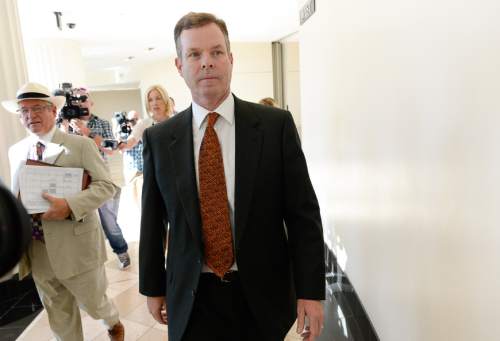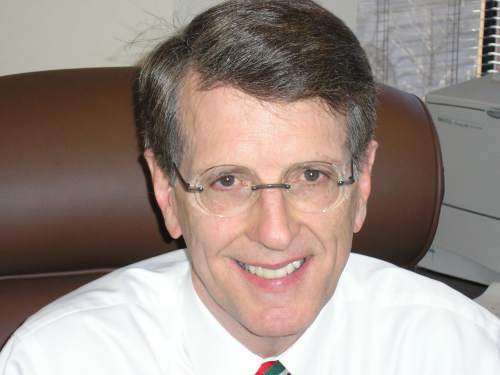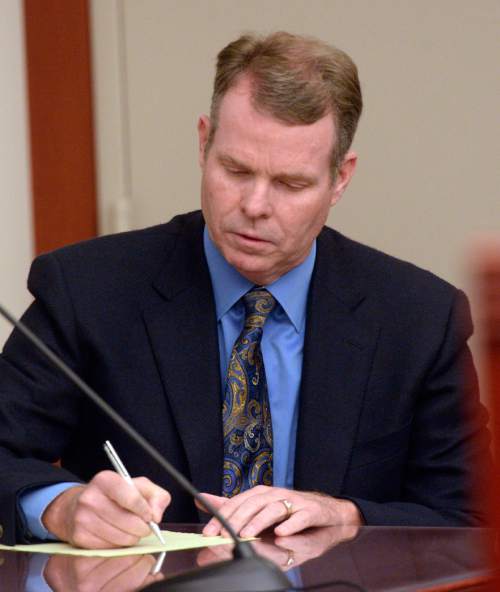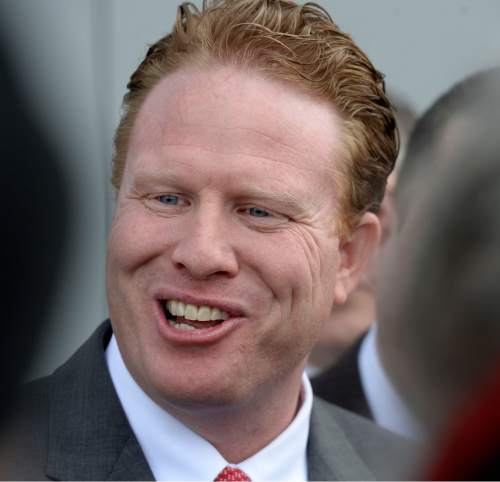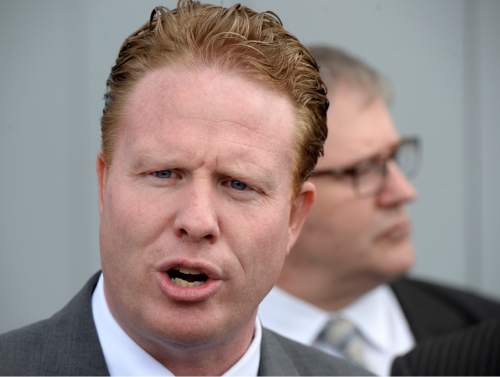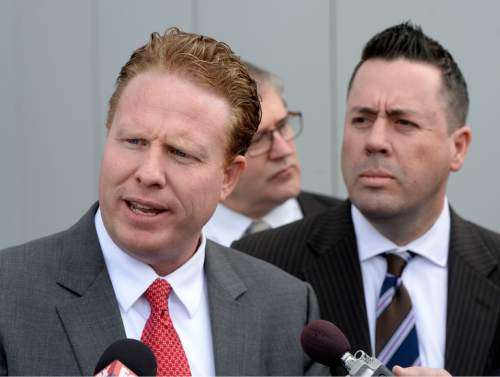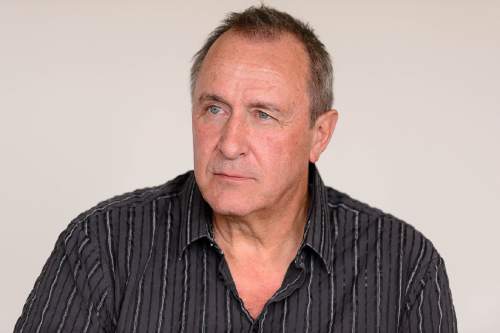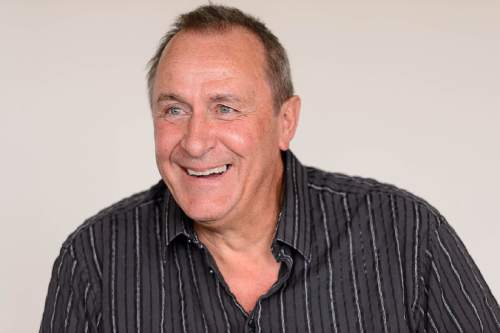This is an archived article that was published on sltrib.com in 2016, and information in the article may be outdated. It is provided only for personal research purposes and may not be reprinted.
Brent Ward went after St. George businessman Jeremy Johnson with zeal in keeping with his reputation as a ferocious and focused federal prosecutor.
But Ward carried out his dogged pursuit at the same time he had a relationship with — and could land a job from — John Swallow, whose 2012 bid to become Utah attorney general was being threatened by Johnson.
Ward's possible conflict of interest is part of a wide-ranging investigation by Davis County Attorney Troy Rawlings, who, according to court documents, hopes to convene a state grand jury to hear evidence in a number of areas.
"The state of Utah has been actively seeking to interview former federal prosecutor Brent Ward," Rawlings wrote in an email.
One of Johnson's attorneys, Karra Porter, said she, too, is investigating a Ward-Swallow connection as she appeals her client's 11-year prison sentence and his conviction on eight counts of providing false information to a bank.
"If the prosecution was tainted by an agenda ... such as a personal conflict of one of the lead prosecutors," Porter wrote in an email, "we will be looking at all available options for Jeremy."
Ward and Swallow previously acknowledged only one meeting. That encounter came in early 2011 when both were weighing whether to seek the seat being vacated by three-term Attorney General Mark Shurtleff. The meeting included John Harmer, a Bountiful resident who headed an anti-pornography group called The Lighted Candle Society, on whose board Ward and Swallow have served at different times since 2005.
"I'm not a friend of John Swallow," Ward told The Salt Lake Tribune in December 2013. "I've spoken with John Swallow once in my life."
Swallow told City Weekly in October 2013 that he had "actually met Mr. Ward once during lunch with Mr. Harmer, and I believe it was in early 2011."
Others, however, insist Swallow and Ward had multiple meetings.
Shurtleff said he saw the pair together at least twice at Lighted Candle functions while he was attorney general.
"It was like Harmer, Ward and Swallow were buds," Shurtleff said. "Clearly it wasn't the first time they had been together. You could tell."
Shurtleff, who recently had criminal corruption charges against him dismissed, said the trio talked to him about bringing Ward into the Utah attorney general's office to prosecute porn cases. Shurtleff added that Swallow later told him he was considering Ward as chief deputy if Swallow became attorney general.
Former Lighted Candle Society Vice President James P. Christensen said he knew Ward and Swallow during his time on the group's board.
"They were very, very close friends," Christensen said. Swallow "would call Brent all the time if we had any questions, even when [Ward] wasn't on the board."
Harmer counters that he introduced Ward and Swallow to each other "long, long after either had been trustees of The Lighted Candle Society" — though one or the other was on the board from 2005 on, according to the group's tax returns.
"The two had never known each other, had never worked together when they were involved with The Lighted Candle Society," Harmer said, "and to my knowledge never had any contact after the luncheon where I introduced them."
Ward did not respond for this story to repeated attempts to contact him through texts, phone calls and emails. (Ward did issue a news release Saturday denying assertions that he had closer ties to Swallow.)
Swallow faces multiple felony and misdemeanor charges related to public corruption. His attorney, Scott C. Williams, declined to comment.
—
To recuse or not to recuse • The U.S. Attorneys' Manual says federal prosecutors have an obligation to recuse themselves from a case if they are seeking employment from someone involved in the matter.
Speaking generally about federal ethics rules, Daniel McConkie, a former federal prosecutor who now teaches law at Northern Illinois University, said such a recusal could be triggered even in matters short of an actual job offer.
"Some type of communication [between the parties]," McConkie said, "some type of understanding — it hasn't blossomed, they haven't talked through the details, but there's a mutual understanding that there's a hope of employment — that would probably be enough."
The U.S. attorney's office for Utah declined to answer questions about whether Ward had disclosed any possible conflict or had been granted a waiver to prosecute Johnson.
—
Mr. Ward goes to Washington • Ward became the U.S. attorney for Utah in December 1981 and attracted the attention of U.S. Attorney General Edwin Meese III for his fervor in combating pornography. In 1998, Harmer and Meese formed The Lighted Candle Society.
Ward left the U.S. attorney's office in 1989 but returned to government service in 2005 as head of the Justice Department's newly created Obscenity Prosecution Task Force.
By 2008, Shurtleff said, Ward wanted to come back to Utah, and Harmer was pushing Shurtleff to hire him to prosecute adult porn.
Shurtleff didn't, and Ward's status changed in 2009 when Eric Holder took over as U.S. attorney general.
"The Obama administration had withdrawn almost all support for Brent Ward on pornography," Harmer said. "Literally, in an office that had 12 people in it, he was sitting there all alone."
Ward came knocking again, Shurtleff said, this time hoping to replace a retiring deputy for civil affairs in the state office. Shurtleff instead picked Swallow, with the understanding that the post could catapult his underling to attorney general.
In August 2010, Ward, still in Washington, emailed Swallow, saying he had approached Harmer about returning to Utah and that he wanted to talk to Swallow about possibly helping the attorney general's office on porn actions while remaining with the federal government.
Back in Utah by early 2011 and stationed at the U.S. attorney's office, Ward started exploring a bid for the Republican nomination for attorney general. Hearing about his interest, Swallow called Ward, Jessica Fawson, a former employee of Swallow political consultant Jason Powers, told investigators.
Ward ended up not running for office and later endorsed Swallow.
"I never talked to him or any other person — period — about the possibility of working in his office," Ward said in December 2013. "I did not ask to work in his office. I never would have asked to work in his office. If offered a job, I would not have accepted it because my job here is better than any job in the attorney general's office."
But Shurtleff said his eventual successor told him in 2011 or 2012 that he might hire Ward as chief deputy of the civil division.
—
The Johnson connection • Swallow's relationship with Johnson began in 2008 when Swallow was chief fundraiser for Shurtleff's re-election campaign and Johnson was flush with cash from his online-marketing company, I Works.
After the Federal Trade Commission launched an investigation of I Works, Swallow, according to Johnson, suggested a meeting with payday lender Richard Rawle, who had experience with Washington. The October 2010 meeting resulted in a $250,000 deal that Johnson has described at times as an attempt to bribe then-Senate Majority Leader Harry Reid, D-Nev. — Swallow has called it a lobbying effort — to help stall the FTC probe. Either way, it didn't work. The FTC sued, alleging consumer fraud, and a court froze Johnson's assets.
In February 2011, Johnson began a persistent head-butting effort to pressure Swallow and Rawle to return some of the money from the Rawle deal, including warnings of impending lawsuits that would have publicly exposed Swallow's role.
In early 2011, the FTC reached out to the U.S. attorney's office for Utah to suggest Johnson be charged with a crime. Ward was one of the prosecutors assigned to the case.
While waiting in June to board a plane to Costa Rica, Johnson was arrested on one count of mail fraud. Ward fought to keep him in jail, and Johnson didn't emerge until Sept. 15, 2011, after 96 days behind bars.
Then, on Feb. 1, 2012, Swallow's appointment calendar shows he had a lunch date with Ward at Little America.
—
The list • Sometime in May or early June 2012, according to Johnson, Ward told the businessman's court-appointed attorney in the criminal case, Nathan Crane, that his client should plead guilty, warning that Johnson's family and friends also could be arrested.
In August, Johnson caved. He later emailed a list of people he wanted protected from prosecution as part of his guilty plea. Included on that list was John Swallow.
Though his motives remain unclear, Johnson later said that although Swallow had made mistakes, he didn't want him to face the same type of criminal prosecution Johnson had endured.
On Nov. 6, Swallow won election. He took the oath of office as the state's top prosecutor Jan. 7, 2013. Four days later, Johnson appeared in Salt Lake City's federal court, prepared to plead guilty to bank fraud.
During the hearing, Johnson produced a copy of his list of those he wanted shielded from prosecution, and Ward agreed to make that tally part of the official record of the plea agreement.
But Ward withdrew his approval after his superior in the U.S. attorney's office looked at the list. The plea bargain unraveled. Within months, a grand jury indicted Johnson and several I Works colleagues on 86 counts.
In late November, Swallow announced he was resigning, and Ward later tossed his hat into the ring to replace him.
"The fact that Brent Ward was willing to grant John Swallow blanket immunity without an investigation stinks to high heaven," said then-Sen. Steve Urquhart, R-St. George.
Ward withdrew from prosecuting Johnson, and later dropped his bid to succeed Swallow.
Johnson was convicted by a federal jury in March on eight counts of providing false information to a bank but was acquitted of 78 fraud-related charges.
Ward retired in December 2015 and is now on a Mormon mission overseeing the visitor center at the LDS Church's Oakland Temple.


